If you're considering dental implants to replacing missing or damagaed teeth in Perth, book an appointment with Dr Rainer Anderson who can explain what treatment involves and answer any questions you have.
The cost of a single dental implant starts from $4641. A fixed bridge starts from $7,800 and All-on-4® Dental Implants from $21,000 per arch or $40,000 for both. To arrange a consult or for more information, call our team today on (08) 9227 8777.
See Prices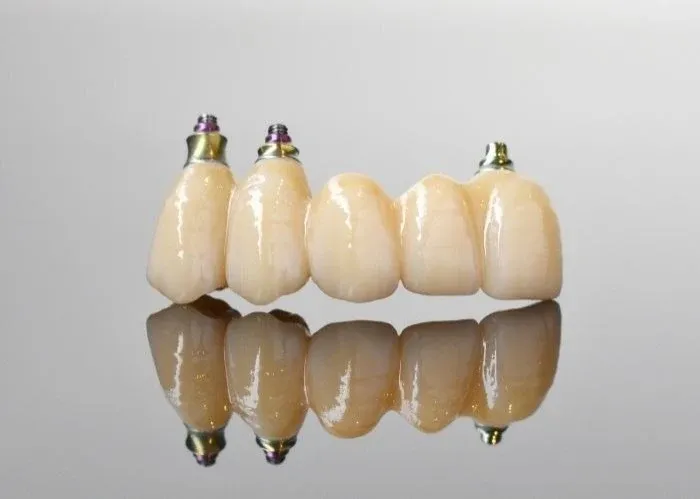
Dental implants provide a more secure foundation for replacement teeth that can improve the look and function of your smile. Unlike dentures or a dental bridge, implants support the jaw to help prevent bone loss and visible signs of ageing.
To be eligible for dental implant surgery, your jaw should be large enough to accommodate the implant and you should be free from oral health problems such as gum disease and health conditions that affect bone healing.
We'll let you know if you're a suitable candidate for dental implants or an alternative treatment during your consultation.
Book online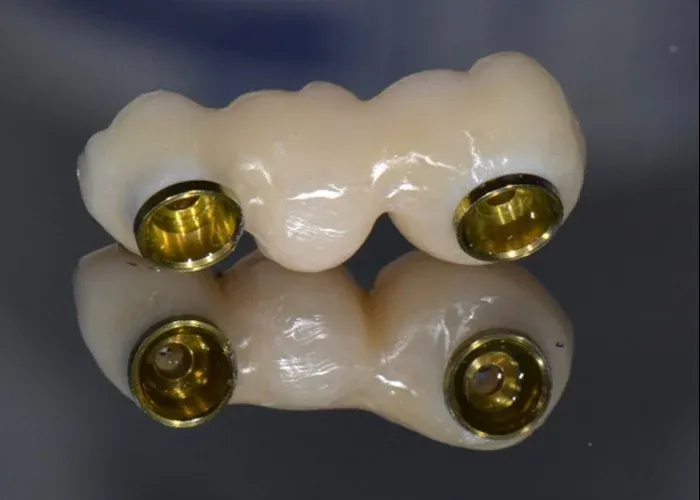
Placing one or more dental implants is a procedure that involves keyhole surgery. The treatment usually requires several appointments to plan your treatment, place the implant in your jaw, cover the implant with a healing cap, and then place your custom crown or bridge once your gums heal.
You would usually wait between 3 to 6 months for your mouth to heal before your crown or small fixed bridge can be placed. If you are replacing all teeth with All-on-4® dental implants, you'll be fitted with a full fixed implant bridge within 1-2 days of your All-on-4® surgery.
Got questions about your eligibility, call us today.
Call us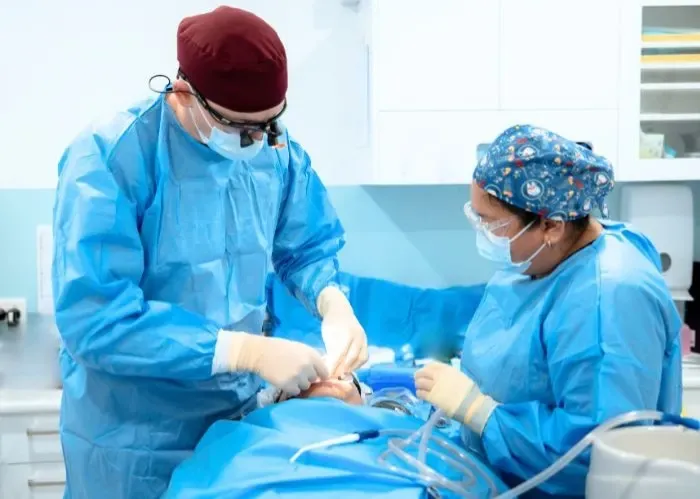
Step 1: Consultation & Treatment Planning
We assess your mouth, take digital impressions and a 3D CBCT scan to assess your suitability and plan your treatment with precision.
Step 2: Placing Your Dental Implants
We carefully place your implant with accuracy. A healing cap is placed over the implant.
Step 3: Designing Your New Tooth
After 2–3 months of healing, we take digital impressions to start designing your custom-made tooth.
Step 4: Creating Your New Tooth
You’ll meet our trusted lab technician, who handcrafts your zirconia crown to blend in with your smile.
Step 5: Fitting Your New Tooth
Your custom crown is securely attached to the implant, restoring both function and appearance.
Step 6: Maintaining Your New Smile
We schedule a review after six months to ensure your implant is healthy and your smile stays in top shape.
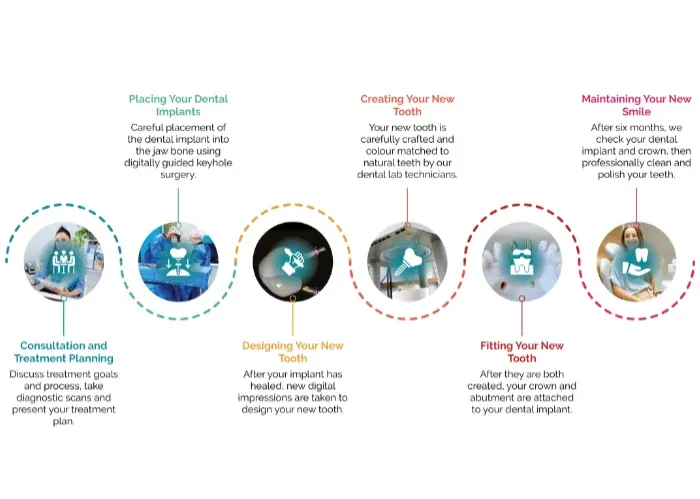
Dental implants have three key components: a titanium post (implant), a connecting abutment, and a crown or bridge. Both the implant and abutment are made from high-grade, biocompatible titanium. Crowns are typically crafted from zirconia, porcelain-layered zirconia, or gold, while fixed bridges (replacing two or more teeth) are usually made of durable zirconia.
For implant-retained dentures, titanium is used for the bar or ball attachments, while the denture itself is made from acrylic.
With All-on-4® dental implants, the initial full-arch bridge fitted days after surgery is reinforced with a titanium frame and made from acrylic. This first bridge can last 2–5 years or longer before being replaced with a more permanent option—usually titanium-acrylic, titanium-zirconia, or porcelain-layered zirconia, all supported by a titanium framework.
See Prices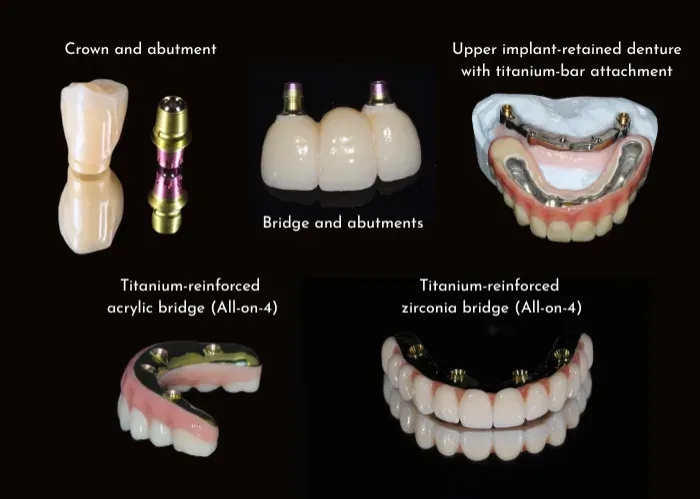
Step 1: Consultation & Treatment Planning
Your dentist assesses your oral health with a 3D scan and digital impressions to determine if you’re suitable for implants. These records help guide precise placement during surgery.
Step 2: Placing Your Dental Implants
On surgery day, any necessary extractions or bone grafts are completed, and your implants are placed into the jawbone with care. Healing abutments may be fitted.
Step 3: Healing Phase
Over the next 3–6 months, your implants fuse with the bone. Temporary teeth are worn during this phase to maintain function and appearance.
Step 4: Designing Your New Teeth
Once healing is confirmed, impressions are taken so our lab can begin designing your permanent bridge.
Step 5: Try-In of Your New Smile
We check the look, feel, and function of your new teeth, making any tweaks before finalising the design.
Step 6: Fitting Your Implant Bridge
Your long-term bridge is securely attached to the implants, giving you a strong, natural-looking smile.
Step 7: Maintaining Your Smile
Six months later, you’ll return for a follow-up to check your implants and enjoy a professional clean.
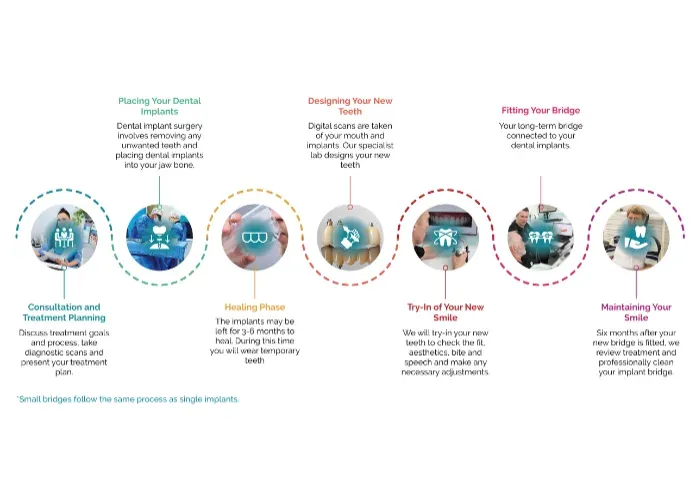
Dental implants are suitable for most healthy adults, but certain factors may affect your eligibility or the long-term success of treatment.
Oral Health Issues – If you have untreated gum disease, this will need to be managed before proceeding with implants.
Jawbone Loss – Implants need a solid foundation. If your jawbone lacks volume or density, bone grafting may be required. For full arch replacements, additional or longer implants may be recommended.
Smoking – Smoking affects healing and can prevent the implant from properly bonding with the bone, increasing the risk of failure.
Pregnancy – Dental implant surgery is generally not recommended during pregnancy due to the potential risks associated with anaesthesia and certain medications.
Chronic Health Conditions – Uncontrolled diabetes can slow healing and increase infection risk after surgery.
High Alcohol Intake – Excessive alcohol consumption can interfere with healing.
Drug Abuse & Poor Compliance – A poor diet, substance abuse, or a history of not following medical advice can limit chances of successful treatment.
Medical History & Medications – Conditions such as blood disorders, heart issues, allergies, or the use of blood-thinning medication should be discussed with your dentist first.
Our dentist will assess your overall health, lifestyle, and oral health to determine if dental implants are the most suitable treatment option for you.
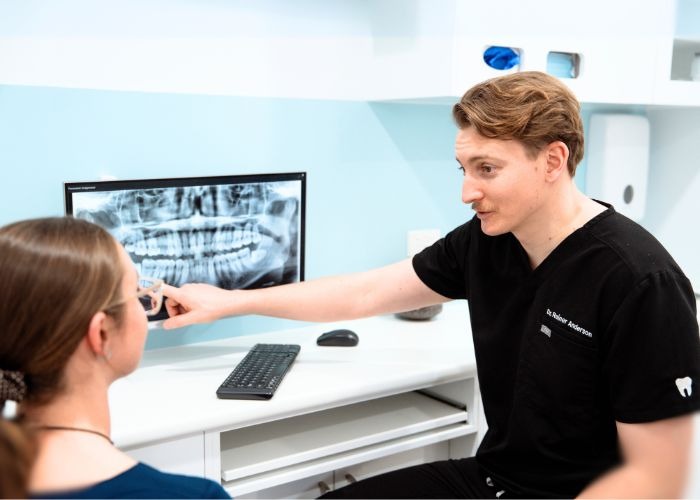
1. Consultation and Treatment Planning
We assess your medical history, take X-rays, examine your mouth and confirm your suitability for implants. You’ll receive a clear treatment plan, including costs and payment options.
2. Making Your Custom Denture
Before surgery, we create a high-quality denture tailored to fit your mouth over a series of visits.
3. Placing Your Dental Implants
During surgery, we remove any remaining teeth and place your implants. Your gums are stitched to heal over 3–6 months, while you wear a full denture.
4. Review and Adjustment
One to two weeks later, we remove stitches, adjust your denture for comfort, and add a soft liner to protect the healing implants.
5. Placing Healing Caps
Once healing is complete, we uncover the implants and place healing caps to shape your gums for the next stage.
6. Denture Abutments and Conversion
We fit denture abutments and take new impressions to either convert your current denture or design a new one.
7. Fitting Your New Denture
Your new denture is fitted and secured. We check for comfort, adjust if needed, and show you how to care for your implants and denture.
8. Maintaining Your New Smile
We recommend check-ups every 6–12 months. Over time, worn components like plastic caps can be replaced, and we monitor implant health with routine X-rays.
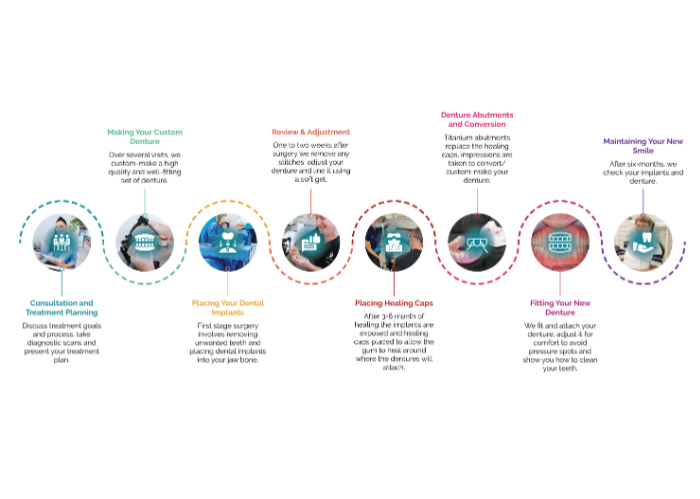
Both implant-retained dentures and fixed implant bridges can be effective options for replacing partial and full arches of missing teeth.
While implant bridges are fixed in place and can only be removed by a dentist, implant-retained dentures are removable and snap on and off abit more like traditional dentures. Check out some pros and cons of implant-retained dentures in the table.
Call us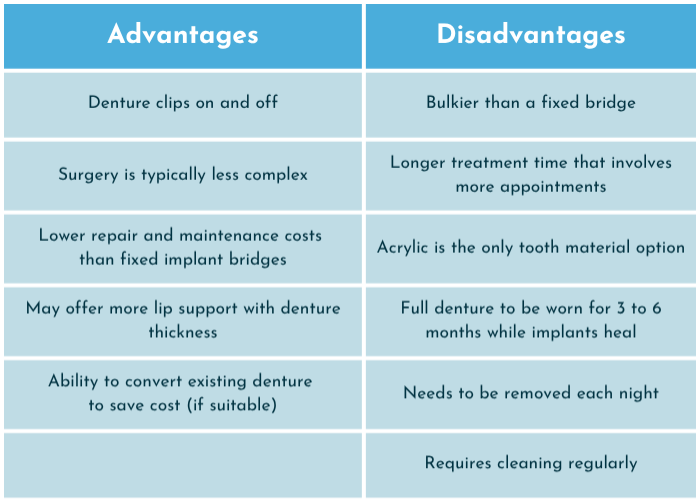
All-on-4® is a premium solution for replacing all missing or damaged teeth using just four dental implants per arch. Developed by Professor Paulo Malo for Nobel Biocare, this technique avoids or reduces the need for bone grafting and offers new teeth within five days of surgery. With a 98% success rate*, All-on-4® provides a fast, stable, and natural-looking alternative to dentures.
Two implants are placed at the front of the jaw and two at the back on a 45° angle to maximise support while avoiding nerves and sinuses. A titanium-reinforced acrylic bridge is tried in and fitted within days, restoring function and aesthetics quickly. Nobel Biocare’s All-on-4® implants are the most recognised full mouth implant system globally and are backed by long-term clinical studies.
*Malo P, de Araújo Nobre M, Lopes A, Moss SM, Molina GJ. A longitudinal study of the survival of All-on-4® implants in the mandible with up to 10 years of follow-up. J Am Dent Assoc 2011;142:310-204
Learn More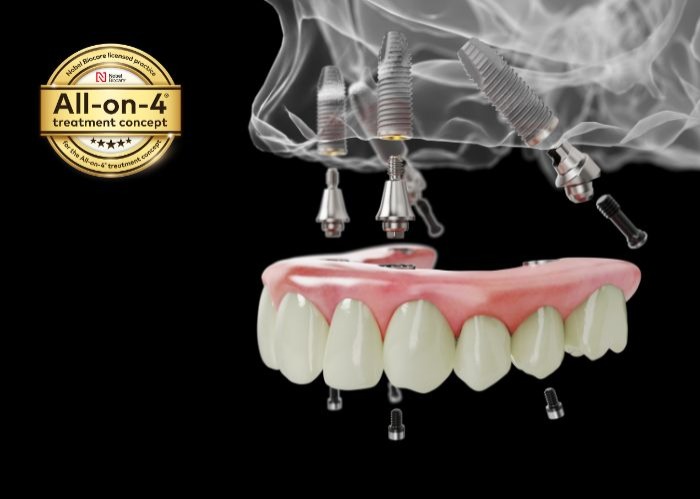
It's common to experience mild pain and swelling after dental implant surgery and the degree of any pain and swelling varies between individuals. It can typically be managed with over-the-counter medication. We also recommend that you eat a soft food diet while your gums are healing and avoid putting too much pressure on the implants. It's important to follow good oral hygiene to prevent problems such as gum disease that may increase the risk of implant failure.
Like any surgical procedure, dental implants have associated risks that our dentist will discuss with you to help you make your decision. We also offer sleep dentistry for anxious patients and more complex surgeries so that you can sleep through the entire procedure.
Book online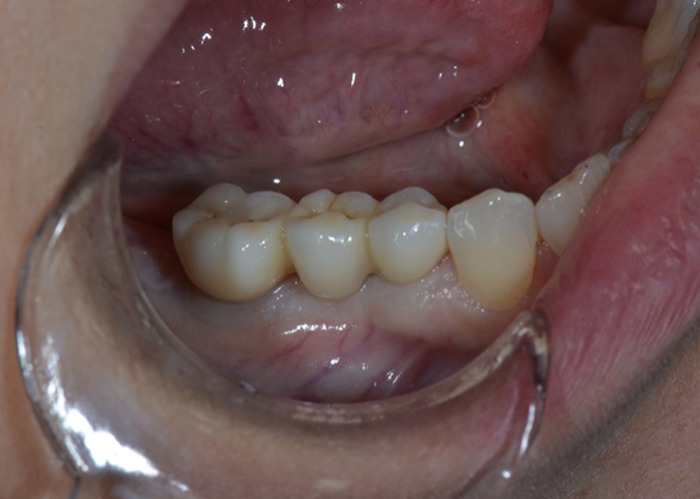
Dental implant risks may include:
Dental implants are a safe and reliable long-term solution for missing teeth, with complications being uncommon when treatment is performed by an experienced and skilled dental professional.
Book an Implant Consult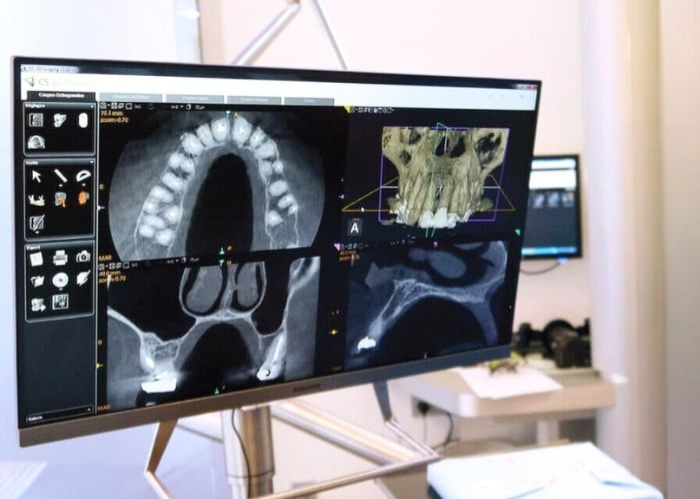
For more information about dental implants or to book an implant consultation with Dr Rainer Anderson, call us today. We'll make sure you have all the information you need to make a fully informed decision.
Dr Rainer provides consults and provides missing teeth solutions using dental implants, including All-on-4® dental implants right here in Mount Lawley.
Book online
We’d like to welcome you to Mount Lawley Dental with our no-gap* new patient offer (valued at $516).
View OfferDental implant surgery is usually performed under IV sedation (also known as sleep dentistry) at the clinic or under general anaesthesia at a day hospital. In both cases, sedation is safely administered by a qualified anaesthetist, while your dentist performs implant surgery.
Dental sedation can be used for any type of treatment, not just complex procedures and may be a suitable option for anxious patients.
A dental implant is a titanium post that's surgically implanted in the jaw to replace a missing tooth root. An implant can support one or more replacement teeth when covered by a crown, fixed partial or full bridge or dentures.
We use a number of tooth materials to ensure your replacement tooth is durable, natural looking and matches the appearance of your surrounding teeth. The implant or screw-like post is made of high-grade titanium and the final tooth is made from either zirconia (basic crown) or zirconia layered with porcelain (premium crown).
If you’re having an immediate implant placed (a bad tooth is extracted and replaced in the same procedure), a temporary acrylic tooth is used while your mouth heals and gets replaced after three to five months.
Dental implant prices depend on how many implants and prosthetic teeth you need, the materials they're made from and other considerations. Dental implants start from $4641* for a single tooth implant and crown. This price includes surgical placement of an MIS seven implant; a titanium abutment; CAD CAM milled monolithic zirconia crown and all x-rays. *Price excludes 3D CBCT scan of $212, used to check jaw bone density and quality.
Dental implant surgery usually takes around an hour per implant. Once placed, it takes several months for an implant to bond with the jaw bone before a custom crown or bridge can be fitted. If you’re having a bone grafting procedure, your total treatment time is extended to allow your mouth to completely heal.
If you prefer to avoid oral surgery and the cost of dental implants, other options are a dental bridge to replace one or several teeth or dentures to replace multiple teeth or all of your teeth.